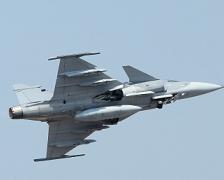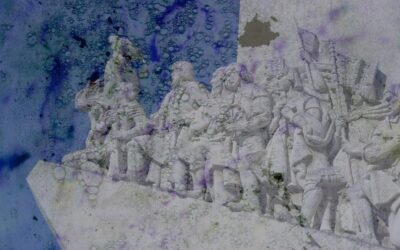The War on Terror is unquestionably the dominant security discourse of our times. It has reshaped our worldwide strategic perspective, reoriented our approach to policing and airport security, and provoked debates about social cohesion. British troops are fighting daily battles in the Middle East and Central Asia, and world leaders everywhere from China to Canada claim to be doing their bit. Yet it remains a problem. Terrorism is not a country like the Soviet Union, nor a specific group of people like Al Qaeda, nor a thing like drugs. Fundamentally terrorism is a choice, and the War on Terror is an attempt to calibrate the consequences of making that choice. Whether it will succeed or fail depends upon many things, but it is undeniably transformative, and one of its effects has been to further undermine the old left/right consensus with old political enemies becoming new found friends. Douglas Bulloch struck a path to the King’s Cross headquarters of the Stop the War coalition and interviewed their convener – Lindsey German – to find out what happens when the War on Terror stops.
An Interview with Lindsey German, Convenor of the Stop the War coalition.
The War on Terror is unquestionably the dominant security discourse of our times. It has reshaped our worldwide strategic perspective, reoriented our approach to policing and airport security, and provoked debates about social cohesion. British troops are fighting daily battles in the Middle East and Central Asia, and world leaders everywhere, from China to Canada claim to be doing their bit. Yet it remains a problem. Terrorism is not a country like the Soviet Union, nor a specific group of people like Al Qaeda, nor a thing like drugs. Fundamentally terrorism is a choice, and the War on Terror is an attempt to calibrate the consequences of making that choice. Whether it will succeed or fail depends upon many things, but it is undeniably transformative, and one of its effects has been to further undermine the old left/right consensus with old political enemies becoming new found friends. Douglas Bulloch struck a path to the King’s Cross headquarters of the Stop the War coalition and interviewed their convenor – Lindsey German – to find out what happens when the War on Terror stops.
Douglas Bulloch: What does Stop the War understand by the term ‘War on Terror’?
Lindsey German: We see it as a systemic change in the way the world operates, which is as important as the Cold War. It will probably last as long and reach out to all sorts of countries. Nothing is really excluded from it. We see it as more than a series of isolated incidents, but as one whole, affecting situations as diverse as North Korea, Lebanon and the murder of Anna Politkovskaya. We tend to focus on the Middle East and South Asia because we feel those are the areas where we can do something because of the involvement of our government.
DB: Is there anything about the War on Terror that you think is necessary?
LG: No, the whole War on Terror is a culmination of American foreign policy from the first Gulf War, the Balkan wars, the sanctions on Iraq in the 1990’s. We don’t excuse terrorism, but the War on Terror simply makes it worse.
DB: What does the world according to Stop the War look like?
LG: The world has to be against new forms of empire and based on the principle of sovereign equality. Developing countries should have the same rights as everyone else and should have their rights and borders respected. I would like to see a genuinely ethical foreign policy, concerned to rid the world of war and deal with the many grievances that cause political tensions, and efforts directed towards raising standards of living rather than spending vast amounts on weapons.
DB: The coalition itself is broadly comprised of old style left wing organisations – SWP, the Unions, CND – and theocratic conservative Muslim organisations. Has the progressive idealism of some of these left wing organisations given way a little?
LG: I don’t think so. We started organising jointly with Muslim organisations in 2002, mainly the Muslim Association of Britain, which I wouldn’t describe as a theocratic conservative organisation. They and the other Muslim organisations we deal with are concerned to develop a Muslim politics in Britain. They are very integrationist not fundamentalist in the way that most people would popularly understand fundamentalism. If you look at the Communists and the Jews in the 1930’s you would have found the same thing, or CND in the 1960’s, working very closely with the church.
DB: What about the tensions within the coalition itself? Because the Muslim Association of Britain are often associated with the Muslim Brotherhood in Egypt, and they have made statements supporting Hamas.
LG: That’s true, but if you compare Hamas with the Muslim Brotherhood in Egypt, the Muslim Brotherhood is an extremely respectable, constitutional form of organisation. It is only the dictatorial nature of the Egyptian regime that pushes it into prison and opposition. Its natural inclination would put it somewhere around the Lib Dems if you can imagine that in Egyptian politics.
DB: What do you think of the Euston Manifesto?
LG: Simple, they are pro-war, we are against war. The Euston Manifesto are a bunch of people who claim to be ‘left wingers’ who essentially make their money out of defending the war. That’s what Nick Cohen has done in the last five years. Before that, he wasn’t a bad campaigning journalist. The war has become for them, the defining issue, which creates huge problems when they want to be critical of the government on domestic issues. Nick Cohen wants to be critical about privatisation, but the war keeps getting in the way because it’s lined everybody up – for or against the war. Norman Geras was an extreme left-winger in his youth. I feel they have abandoned any criticism of Imperialism under the guise of disquiet with Muslims and worries about theocracy and all this kind of thing. So I would say we have very little in common.
DB: Both organisations claim to be left wing yet have a different position on the war. Do you think this is the real significance of the War on Terror? That it has created a new cleavage around which people organise politically?
LG: But how can you be left wing and be pro-war? This is a serious question. This is not an ideological battle of any value. People went and fought and died in Spain in 1936 because they believed they were fighting for a higher principle. The Euston Manifesto don’t have a higher principle. There isn’t one. They can claim they are left wing as much as they want, but they are the mouthpieces of the right, and they don’t like to admit that. Also, we’re a mass organisation which has all these affiliated bodies, they are a tiny number of self appointed journalists and media people. If they are confident they have left wing following which is pro-war, perhaps they’d like to organise a demonstration at some point. We’ll see how many people turn up, I guess it might fill a phone box.
DB: How does the United Nations feature in the world view of Stop the War?
LG: We would agree with many of the aims of the UN, but we have people with different views on the extent to which it only ends up representing the views of the great powers.
DB: The two most live issues at the moment are Iraq and Afghanistan. Do you see them as different?
LG: Yes, they are different. Afghanistan was an easy target – one of the poorest countries in the world, a very weak government – which was a pariah by world standards – and no effective army or air force. Iraq was obviously different in many respects but the biggest difference was how much the Iraq occupation was contested.
DB: So both strategic and principled differences?
LG: Yes, but although more people would say Afghanistan was justified than would for Iraq, people are very rapidly coming to the conclusion that it was always a war we couldn’t win and certainly can’t win now.
DB: Are there potential interventions that Stop the War would be ambivalent about or even supportive towards?
LG: We’re not opposed in principle, but I can’t imagine a British or American intervention that we would support.
DB: Kuwait 1991?
LG: No, I was very much opposed to the war over Kuwait. Most Iraqis even today regard Kuwait as part of Iraq.
DB: But that doesn’t square with the idea of sovereign equality?
LG: But then you have to ask how you deal with breaches of sovereignty, do you deal with breaches of sovereignty by a bigger power coming along and bombing the hell out of a country? or by diplomacy and other means of pressure? And after all, the best way to deal with dictators like Saddam Hussein is not to create them in the first place.
DB: Don’t you think that the collapse of the Soviet Union, and the collapse of the bipolar world order, shifted the moral spectrum by which these alliances came to be measured?
LG: Yes, but rather than the moral spectrum shifting, I think suddenly the Americans thought they could get away with invading, when previously this hadn’t been possible.
DB: So when George Bush Snr. proclaimed a New World Order, and that it was no longer appropriate to support dictators just because they are friendly dictators, you think he wasn’t serious?
LG: The Cold War balance of power kept more of a peace than we have now. But I acknowledge that wasn’t a great situation for many people on the ground.
DB: If you had to position yourself politically within that bipolar order, were they both as bad as each other?
LG: I always supported Robert Mugabe and ZANU, although I wouldn’t now. They were more effective than ZAPU in terms of overthrowing Ian Smith. I supported the NPLA in Angola, which was the pro Russian liberation movement because I thought UNITA and the FNLA were really acting on behalf of the imperialist powers, so no, we did take sides.
DB: But in terms of Bosnia, Serbia/Kosovo, East Timor, Lebanon as examples of intervention, you wouldn’t support them?
LG: No I didn’t support them. I think you have to look at the motives, and examine whether it will increase the power of the imperialists or the rich and powerful, or if it will increase the power of the ordinary people of the country, and I would say that in all of those above cases, it didn’t. I know a lot of people who disagrees with me, even in Stop the War, but I feel they were wrong.
DB: So, in terms of the detail of UN resolution 1701 governing intervention in Lebanon, do you think it is problematic to begin with?
LG: Yes, I think that Israel shouldn’t have invaded in the first place. I believe that the initial kidnap of the two soldiers was not sufficient reason for going to war. If you read Seymour Hersh he believes this was planned in advance with the collusion of the Americans, and if he’s right then it was a deliberate attempt to take out Hezbollah as a prelude for an attack on Iran. And with the UN at Beirut airport and along the Syrian border, UN resolution 1701 is an aggressive act really.
DB: Which is why you think the UN will eventually end up in some confrontation with Hezbollah?
LG: It will end up with the UN completely powerless or in confrontation with Hezbollah and with other Lebanese.
DB: The Euston Manifesto explicitly supports a two state solution. Is that something Stop the War can support?
LG: Stop the War does not endorse one position over any other. We take a position of freedom for Palestine, Justice for Palestine. I’d like to see one secular state, where Jews, Christians and Muslims live together, but that depends on Israel accepting the Arabs as equal to them. The reason Stop the War doesn’t take a position on this is obviously because it’s divisive and we try to avoid taking positions which will stop us campaigning, but I would say it is more divisive among non-Muslims. It’s a divisive question on the left. We have Jews in Stop the War who are in favour of one state. We have Palestinians who are in favour of two states, and we certainly have plenty of white English people who are in favour of two states. But one thing Stop the War was agreed on was in supporting an immediate ceasefire.
DB: In the case of Darfur, is there a general suspicion you have concerning the motives of intervention?
LG: Yes, I certainly do have a suspicion of it. I think it’s a terrible situation but I don’t see what the hell it has got to do with Britain or Germany or the United States, or indeed a bunch of newspaper columnists sitting in London. Surely this is a matter, for African countries?
DB: Who are to some extent involved already.
LG: I think the last people who should be talking about an intervention in Darfur are the people who were gung-ho about intervening in Iraq, particularly in the light of this figure of 655,000 people killed in Iraq. What happens if we intervene, and there are still thousands of people dying?
DB: CND is a member of Stop the War, and Trident has a clear focus in your campaigns. Is Stop the War committed to unilateral disarmament?
LG: One of the slogans of our demonstration in Manchester was ‘No Trident Replacement’ which CND were very keen on, but we all support it.
DB: So it’s a principled position that we shouldn’t have nuclear weapons. But when you talk about North Korea for instance or Iran, how do you talk about their attempts to develop nuclear weapons?
LG: You should speak to CND just in case I quote them unfairly on this. What we say is that we’re against nuclear weapons but there is an awful lot of hypocrisy in the international community. I don’t like the argument very much, but I can see the logic of Iran or North Korea trying to acquire them to ward off an American attack. The Iranians see this as a matter of national pride. It is about getting electricity in Teheran, about Iran being a modern world player, North Korea similarly.
DB: If a British politician makes the case that as long as Russia has nuclear weapons we should keep ours, you would regard that as wrong, but in terms of Iran or North Korea developing nuclear weapons, you can understand the case that they make. Is that an entirely consistent position?
LG: I don’t think you can regard British acquisition of Trident in the same way that countries like Iran seek to acquire nuclear power, which is just one of the terrible logics of nuclear armaments. This is the world we have and the one we have to sort out, and we’re not going to do it by asking ‘should x country a nuclear bomb or not?’ The whole notion of war and competition has to be overthrown.
DB: So Trident is connected to the War on Terror?
LG: It is part of Britain’s commitment to America who would go absolutely crazy if Britain dropped Trident.
DB: Is the wearing of the veil connected to the War on Terror?
LG: Definitely. The last respectable racism in Europe is against Muslims. They are being treated in the way that Afro-Caribbeans were treated 30 years ago, that Jews were treated before the Second World War. They are being treated in this discriminatory way. Jack Straw says he is only raising a debate. That is exactly what Enoch Powell said in the sixties.
DB: Jack Straw did also say that he is against the wearing of the veil.
LG: That’s right. Only 5% of Muslim women in Britain wear the veil. I’m not in favour of women wearing the veil if they don’t want to, but in a democratic society it should be their choice. Imagine if a Muslim MP refused to speak to a young woman because she was wearing a mini-skirt? It is not the job of an MP to do this. More importantly it’s shifting the political atmosphere to the right where the main beneficiaries will be the far right, who are making big gains in lots of parts of continental Europe. None of this would be happening without the War on Terror, which has developed out the last 20 years of American foreign policy to do with Israel, Palestine, Saudi Arabia and Iraq.
DB: Are many issues that affect Muslim individuals anywhere in the world also connected to the War on Terror?
LG: Yes. We live in a very small world, and I would say that most Muslims in this country want to integrate into British society. They are desperate to be treated equally and their kids to get a good education and a future.
DB: And you don’t think the veil stands in the way of integration?
LG: No I don’t. Lots of women have started wearing the headscarf, not the veil, as a statement of identity. So no I don’t think it plays a role.
DB: So you don’t think the veil – and I am talking specifically about the veil not the headscarf – and Jack Straw was also talking about the veil – interferes with integration? You made a reference to Jack Straw’s comments and said that ‘he should hide his face in shame’. Do you not see the irony of criticising Jack Straw’s comments by using a metaphor that associates the hiding of the face with shame?
LG: No, not really. I was using it in the way that people would hide their face in Britain. People don’t traditionally wear the veil in Britain and it would be rather surprising if I or anybody else started wearing the veil.
DB: But that gets to the heart of the question. Is there not some wider point illustrated by supporting a woman’s right to wear a veil as a personal choice, rather than commenting on the social institution of the wearing of the veil?
LG: I think the distinction here is not whether you would do it yourself, but that people should have the right to do it. There are a small number of young educated women who’ve taken a political decision to wear the veil, but for most of them it is a cultural thing. Is it really right to pick on these people and provoke incidents like in Liverpool, where a woman had her veil snatched from her face? This isn’t a civilised dinner party debate, it will be used by people who want to attack Muslims. I think it has very tangible consequences, which are highly regrettable.
DB: What kind of statement do you think the women who wear the veil as a political choice are making?
LG: I think it’s entirely up to them. I probably wouldn’t agree with some of their politics, because some of them would want a separate Islamic state, but you can’t even assume that. It is absolutely their choice, and if we want to win young Muslim women towards being part of our society, then we have to treat them with respect and dignity.
DB: The War on Terror continues, have Stop the War had any successes so far?
LG: Our success so far has been that Blair is going. The war has done for him. Lebanon was the straw that broke the camel’s back.
DB: And a further success would be withdrawal of Western troops from Afghanistan and Iraq?
LG: Yes, a success would be withdrawal of Western troops, particularly British troops from Iraq and Afghanistan, but we will continue to campaign against the War on Terror even after that.
DB: And the aftermath of withdrawal?
LG: If someone wrecked your house and killed your family, then stayed to put it back together again, what would you think? 92% of Iraqis want us to leave and surely it’s their decision. If 92% of us wanted foreign troops to leave we’d hope they would go and certainly would fight them until they went.
DB: So you do see it as a liberation movement?
LG: Not necessarily, there are different elements, but the Iraqi people have got the right to resist a foreign invader, and that’s what they’re doing.
DB: Thank-you very much for you time.
Clearly Stop the War is a deliberate compromise. It represents a group of campaigning organisations who reject the terms of the War on Terror, believing it to be a quasi imperialist pretext for the extension of American power. They do not attempt to justify terrorist attacks, but they assess the cause of terrorism to be the aggressive expansion of American influence since the end of the Cold War. But this also illustrates a problem. They acknowledge the importance of the War on Terror, but oppose it on the grounds that there is only one side fighting it. If America and the West would simply stop intervening in situations that are none of their business, there would be no terrorism. They see continuity between the old Cold War bipolarity and contemporary resistance to America, but part of that continuity is found in their own sympathies, both past and present. The central logic of their alliance is opposition to America, which explains their hostility to Blair, to Trident, and to Israel, and it explains their ambivalence towards the UN, North Korea, and Iran. There is no room in their analysis for the changed logics of a post Cold War world, and in their yearning for the certainties of the past they still see Saddam as an American puppet, Al Qaeda as the natural product of American interference, and nuclear weapons as the regrettable but understandable aspiration of all threatened states, except our own.
The End of the Cold War is often thought to have precipitated a search in America for a new enemy. But while America searched for a new enemy, the old left quietly searched for a new friend, a new ideological counterpart to triumphant liberal capitalism, and with the advent of the War on Terror, they found one. But in lumping everything from the wearing of the veil, to Trident, to North Korea all within the War on Terror they can oppose everything from perceived racism at home, to the prospect of humanitarian intervention anywhere. It becomes a way to view every political choice through the exclusionary dynamics of opposition to imperialist America and turns legitimate questions of politics and social relations into grievous insults. It is ironic that Stop the War depend for their popularity on the strength of the very discourse they oppose, but it is perhaps more troubling that their vision of the future is just another tired vision of the past. Stop the War may align itself with wider sentiments concerning the war in Iraq, but it is not about Iraq, it is about America. And it is not about Stopping the War, but Stopping the World, and getting off.
Douglas Bulloch was born in Canada, grew up in the UK and lives in Shanghai. He spent many years working on the financial reporting side of the oil business before returning to academia to write a political-theory heavy PhD in International Relations. His two young children leave him little time to think, but give him many reasons to

















